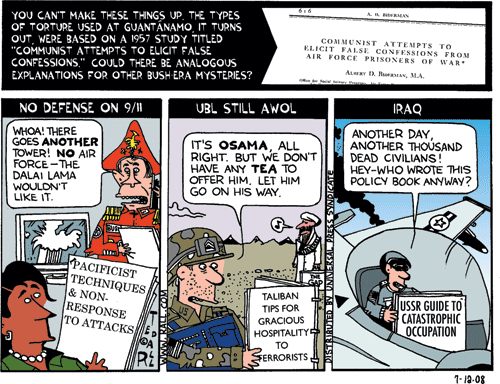Jasim Al-Azzawi interviewed U.S. Ambassador to Iraq Ryan Crocker. Thanks to Juan Cole for
disseminating this. See the
video. This is not a full or official transcript, but my slow typing paraphrase. Watch the video if you want complete accuracy.
q. How do we understand conflicting statements by Iraq and U.S. governments about the Status of Forces Agreement negotiations.
a. I don't see a contradicton. We are saying the same thing.
q. Iraq National Security Advisor Rubaie said Iraq will not accept a SOFA without a withdrawl date.
a. The next day he talked about a 'planning time horizon'. Force withdrawls are underway and will continue. The last 'surge' brigade will leave soon. Combat troop numbers down 25% over last year.
q. With the improved security in iraq, explain the rush to reach a SOFA before the end of July.
a. Getting it right is more important than getting it quick. Both governments are anxious to get an agreement.
q. On December 31 the UN mandate runs out. Three optioins are: a short, temporary agreement, another UN mandate, a long term agreement. What is the rush?
a. We need to have basic legal agreement that provides authority and protections for US forces to operate. A short term agreement is a possibility until a longer term agreement is done.
q. why do doubters suspect a short agreement is a ploy to get foot in the door>
a. Americans and Iraqis seek the same thing: Iraqis fully in charge of security.
q. 31 iraqi legislators wrote congress they reject any agreement without a timetable to leave completely, i.e. no bases or troops left behind. Are you taking into account the will of the Iraqi people?
q. Iraqis are concerned that the agreement has supplemental, undeclared provisions. Can you assure that final agreement won't have secret provisions
a. This will be an open transparent document. It must go before Iraqi parliament, and we have pledged to be fully open with the US Congress. It doesn't make sense to brief parliaments on positions that are not final.
q. Lt. Gen Dubik says Iraqi troops will be fully functional by 2009, and the US role will be for training and other issues. When will iraqi forces take control?
a. They are already taking control. 75% of Iraqi units are "in the lead".
q. How do you explain that the GAO says that number is only 10%?
a. In terms of operational readiness assessments, ORA 1 is the highest, ORA 4 is the least...blah blah...
ORA 2 instead of ORA 1 doesn't mean that units are incapable of fighting.
q. You say only 3 of 18 benchmarks are not met. The GAO says 9 of 18 not met.
a. When we talk about benchmarks, they can be fully realized or show satisfactory progress. It is not a black and white situation. Not 100% operationally ready doesn't mean not capable. Debaathification is not done but there is a law, so we think that is satisfactory progress.
q. There are several factors for improved security. Several sources say Iran is lessening aggressiveness
a. iran has suffered setbacks. iran supported militias hurt in combat with iraqi forces. Many fled to Iran. Iran not helping, but Iraqi forces are hurting militias. Iran's stated policy is to support democratic Iraq. Its behavior is opposite, to undermine it, and support militias, not the government. Iran has to decide what kind of relationship it wants. The past is bitter, but there is opportunity.
q. How doe you assess Iraq's future will it be a prosperous democratic country?
a. iraq is emerging from violence of past years as a democratic country in charge of own affairs. It will take time to overcome problems from the Saddam era.


